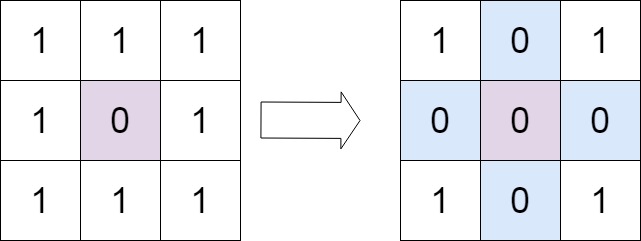LeetCode-in-All
73. Set Matrix Zeroes
Medium
Given an m x n integer matrix matrix, if an element is 0, set its entire row and column to 0’s, and return the matrix.
You must do it in place.
Example 1:

Input: matrix = [[1,1,1],[1,0,1],[1,1,1]]
Output: [[1,0,1],[0,0,0],[1,0,1]]
Example 2:

Input: matrix = [[0,1,2,0],[3,4,5,2],[1,3,1,5]]
Output: [[0,0,0,0],[0,4,5,0],[0,3,1,0]]
Constraints:
m == matrix.lengthn == matrix[0].length1 <= m, n <= 200-231 <= matrix[i][j] <= 231 - 1
Follow up:
- A straightforward solution using
O(mn)space is probably a bad idea. - A simple improvement uses
O(m + n)space, but still not the best solution. - Could you devise a constant space solution?
To solve this task using Python with a Solution class, you can follow these steps:
- Define a class named
Solution. - Inside the class, define a method named
setZeroesthat takesmatrixas an input parameter. - Implement the logic to set entire rows and columns to zeros if any element in the row or column is zero.
- Use two boolean arrays
rowsandcolsto keep track of which rows and columns need to be zeroed out. - Iterate through the matrix and update the corresponding elements in the
rowsandcolsarrays if any zero is encountered. - Iterate through the matrix again and set the entire row to zeros if the corresponding
rows[i]is True, and set the entire column to zeros if the correspondingcols[j]is True.
Here’s the implementation:
class Solution:
def setZeroes(self, matrix):
"""
Do not return anything, modify matrix in-place instead.
"""
m, n = len(matrix), len(matrix[0])
rows, cols = [False] * m, [False] * n
# Mark which rows and columns contain zeros
for i in range(m):
for j in range(n):
if matrix[i][j] == 0:
rows[i] = True
cols[j] = True
# Set entire rows and columns to zeros
for i in range(m):
for j in range(n):
if rows[i] or cols[j]:
matrix[i][j] = 0
# Example usage:
solution = Solution()
matrix1 = \[\[1,1,1],[1,0,1],[1,1,1]]
solution.setZeroes(matrix1)
print(matrix1) # Output: [[1,0,1],[0,0,0],[1,0,1]]
matrix2 = \[\[0,1,2,0],[3,4,5,2],[1,3,1,5]]
solution.setZeroes(matrix2)
print(matrix2) # Output: [[0,0,0,0],[0,4,5,0],[0,3,1,0]]
This solution has a time complexity of O(m * n), where m is the number of rows and n is the number of columns in the matrix. It modifies the matrix in-place, fulfilling the requirement of the task.
Solution
from typing import List
class Solution:
def setZeroes(self, matrix: List[List[int]]) -> None:
"""
Do not return anything, modify matrix in-place instead.
"""
m = len(matrix)
n = len(matrix[0])
row0 = False
col0 = False
# Check if 0th column needs to be marked all 0s in future
for i in range(m):
if matrix[i][0] == 0:
col0 = True
break
# Check if 0th row needs to be marked all 0s in future
for j in range(n):
if matrix[0][j] == 0:
row0 = True
break
# Store the signals in 0th row and column
for i in range(1, m):
for j in range(1, n):
if matrix[i][j] == 0:
matrix[i][0] = 0
matrix[0][j] = 0
# Mark 0 for all cells based on signal from 0th row and 0th column
for i in range(1, m):
for j in range(1, n):
if matrix[i][0] == 0 or matrix[0][j] == 0:
matrix[i][j] = 0
# Set 0th column
if col0:
for i in range(m):
matrix[i][0] = 0
# Set 0th row
if row0:
for j in range(n):
matrix[0][j] = 0

